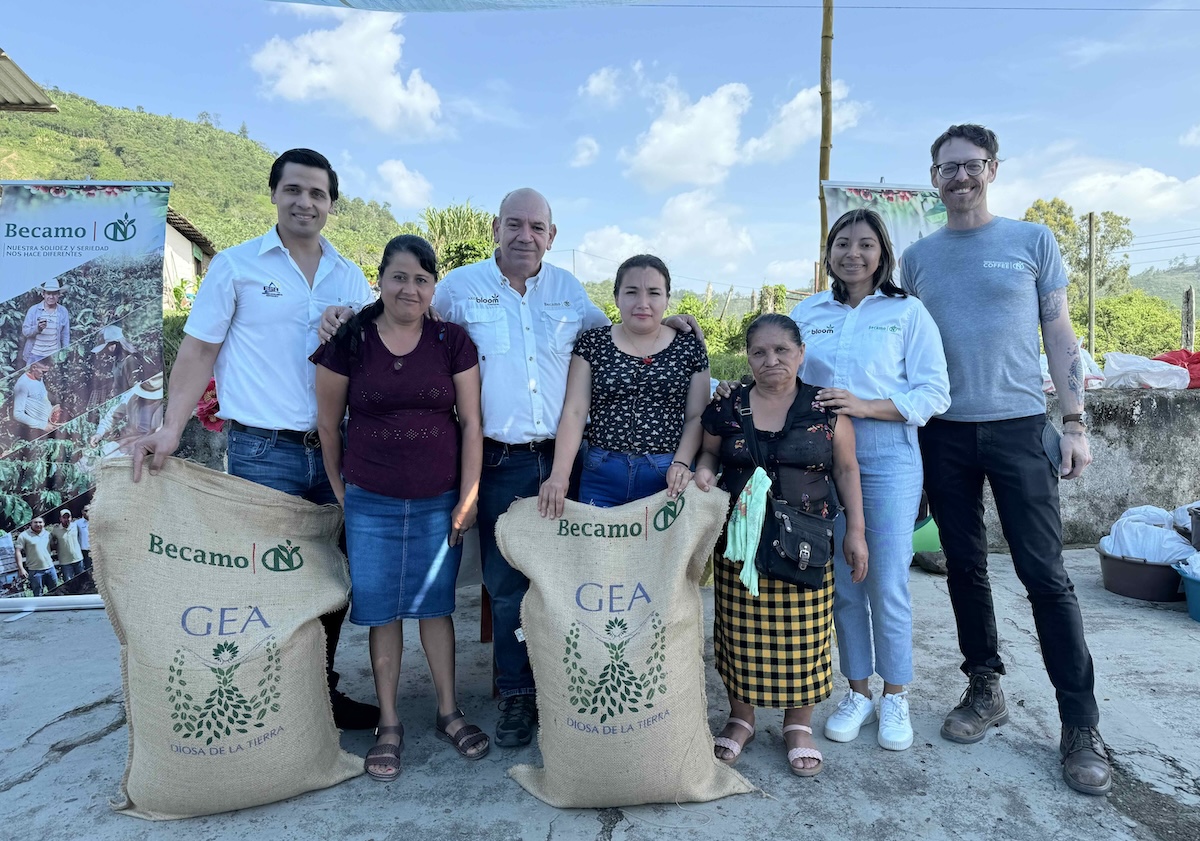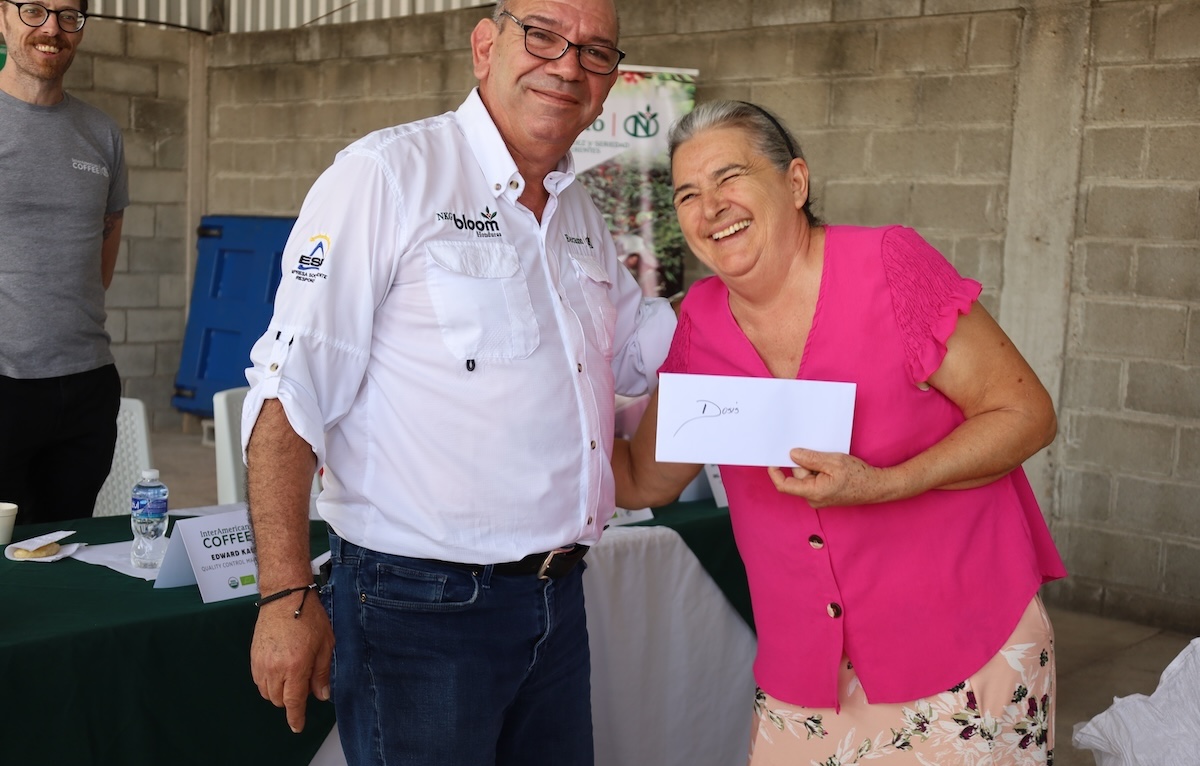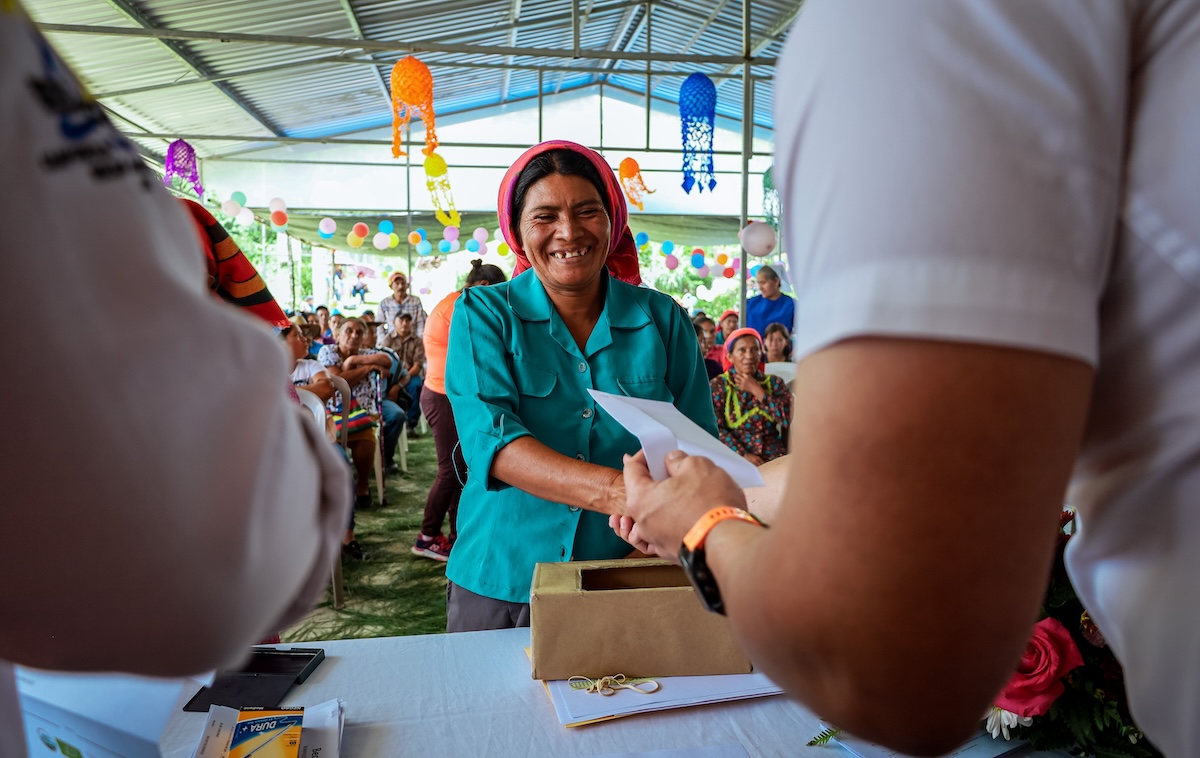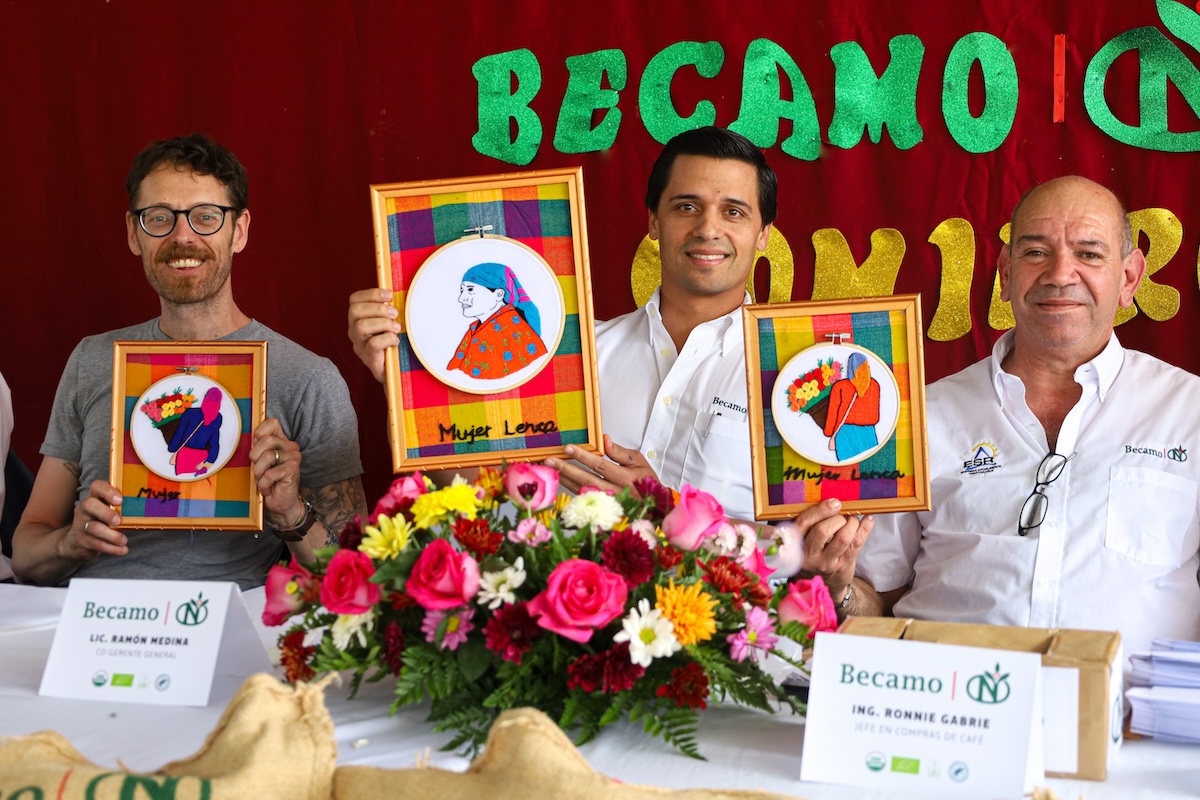In July, Ed Kaufmann traveled to Honduras to spend time with colleagues at NKG coffee exporter Becamo. Together, they visited many of the women producers who contribute to Honduras NKG Bloom Gea Organic. It was an occasion to deliver certification premiums and a few gifts from Becamo — and, it turned out, to receive much in return. Below is an excerpt from Ed’s trip report.
—
Hello, Honduras!
After 10 years, it was great to be back at Becamo.
After saying hello to the teams in the office, I continued to the dry mill. There was very little coffee left to export, so the mill team was cleaning and repairing equipment, getting ready for the next harvest. The mill manager, Don Edgardo, and his assistant, Mauricio, talked about the massive mechanical drying facility. There are about 12 vertical silo driers that dry the coffee in about 32 hours. They receive wet parchment deliveries from some producers and groups, because many don’t have room to dry their coffee or live in rainy areas where drying is a challenge.
We toured the receiving and production lines, which can mill about three containers an hour. There’s also a smaller line for processing microlots. We discussed their methods for receiving parchment and how they use it, based on the quality of what’s delivered. They’re very focused on efficiency, so they will categorize a coffee upon receipt, store it in one of a few warehouses and designate the lot for certain qualities.
Siguatepeque and CAUFUL
Becamo CEO Ramon Medina picked me up at 5:30 a.m., as we had two events and much driving ahead of us. After swinging by the office to pick up more colleagues and supplies, our first stop was the Becamo purchasing station in Siguatepeque, where Becamo was holding an event to distribute premium payments to producers who had delivered certified coffees during the season.
It was a festive occasion, with plenty of coffee and pastilles (delightful banana-stuffed pastries – I think I ate 12). I assumed that I’d hang in the back and clap for the producers as they received their checks, but the team surprised me with a spot at the front table where I could say hello and help distribute the checks. It was a special experience to shake hands with these wonderful producers and help celebrate their earned extra income.

Ed Kaufmann of InterAmerican Coffee (far right) and Ramon Medina (far left), Wendy Calix (second from right) and Ronnie Gabrie (center) of Becamo, pose with CAUFUL producers whose coffees contribute to the all-women NKG Bloom Gea brand.
Afterward, we spent time chatting with a few producers, and several mentioned the proximity of their farms to the purchasing station. A few were less than a 15-minute drive away. They seemed happy to have a supply-chain partner like Becamo so close by.
We packed up and began our long drive to the La Paz region to distribute premium checks to the ladies of the CAUFUL cooperative for their participation in the NKG Bloom GEA coffee program. It was truly an honor to be part of the festivities, calling the names of the women producers and handing them their checks.
The Becamo team also handed out gift baskets and raffled off fertilizer (Organic-approved, of course), shovels and other farm supplies, adding to the festive environment.
After the ceremony, we drove to La Esperanza in Intibuca, where we would spend the night at Cabanas de Carlos.

Becamo Head of Purchasing Ronnie Gabrie with Doris, a producer in Siguatepeque and a contributor to NKG Bloom Gea.
Intibuca to COMIPRONIL
After breakfast and coffee with the sunrise, we headed out over bumpy roads to visit the amazing producers of COMIPRONIL. The co-op is Organic certified, mostly run by women, and a contributor to NKG Bloom Gea — a blend of coffees from women producers within a handful of cooperatives. It was a beautiful drive and a beautiful day.
We were greeted with a decorated venue and a full house of women coffee producers and their families. They had music playing and the women were dressed in bright, festive colors. The energy was spectacular, and the women were in charge! After some speeches, prayers and songs, we handed out the bonus payments.
The COMIPRONIL producers — known for their festive head wraps — shared lovely gifts with us of honey from their hives (wrapped in embroidered cloths and festive wraps) as well as handmade gifts they’d made for the occasion. To receive a gift that required still more of these producers’ care and time was immensely special.
After the ceremony, we had lunch and spent time with the co-op manager, Myra Gomez, and the president of the co-op, Nicasio Domiguez. We heard about their thriving group and the investments it’s making to improve quality and increase volume. It’s finishing construction on its new wet mill, which will allow members to centrally process cherry. This will allow the group to better monitor the washing and drying of coffees. Their energy was contagious.

A COMIPRONIL producer receives her premium check.

Ed Kaufmann, Ramon Medina and Ronnie Gabrie with gifts presented to them by women producers within the COMIPRONIL cooperative.
Becamo and Final Reflections
On the drive back to San Pedro Sula, Ramon spoke about how special he felt the COMIPRONIL group is, and I agreed. They’ve been consistent and wonderful to work with, so Ramon’s goal is to find importers and roasters that will also be consistent and buy their coffee year after year. Next year, we agreed, it would be wonderful to bring roasters with us on these special visits, to help build long-lasting relationships that can hopefully enforce solid supply chains and benefit both sides. I’m looking forward to helping make it happen.
Back at Becamo in Villanueva, I was eager to cup and green-grade with the QC team. We had a wide range of qualities on the table, but we were all still very closely calibrated, which was exciting. We discussed the relevance of moisture content, water activity, drying and quality — and more specifically, the longevity of quality. They have been conducting experiments and slowly confirming their findings.
I also spent some time grading green coffee with Edy, Becamo’s head of QC, which was also very productive. There’s no substitution for some in-person experiences. We now feel more connected and calibrated, which means more trust between the labs and the companies.
My flight back allowed for some good reflection time. My biggest takeaway was ultimately a feeling of inspiration and a desire to pass that along in support of Honduran producers. The women of COMIPRONIL, in particular — the challenges they face and yet all they make possible — have especially stayed with me. I’m eager to connect with roasters who will find value in the relationship and who can possibly visit next year and learn more for themselves. By sharing it, I hope to keep the inspiration alive. •
—
Ed Kaufmann is QC and Customer Development for InterAmerican Coffee.